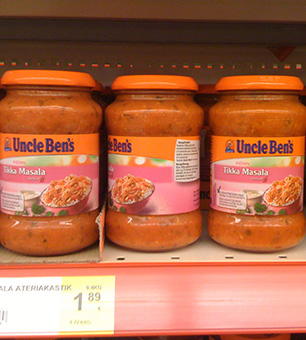 (Photo: Michael Coté / Flickr)It’s time to get serious about what’s in the food we eat.
(Photo: Michael Coté / Flickr)It’s time to get serious about what’s in the food we eat.
Today, the Obama Administration rolled out a new proposed “Nutrition Facts” label to replace the current nutrition labeling on foods, and it doesn’t go anywhere near far enough.
The new proposed labeling would display calories in a larger and bolder type, would include categories like “Avoid Too Much” and “Get Enough,” and for the first time would include an added sugars category.
The new labeling is supposed to reflect the changes in nutrition science that have occurred since food labeling and nutrition facts were first rolled two decades ago.
While fats were the focus back in the 1980’s, nutritionists today are more concerned with overall calorie intake.
Speaking about the new labels, Mrs. Obama said that, “Our guiding principle here is very simple, that you as a parent and a consumer should be able to walk into your local grocery store, pick up an item off the shelf and be able to tell whether it’s good for your family.”
Mrs. Obama is absolutely right. We have the right to know what’s in the food that we eat, and if it’s actually healthy for us.
But to achieve that goal, we need to go beyond a new nutrition facts label, and start labeling ALL of the things that are in the foods that we eat.
And that starts with labeling all genetically modified foods.
Out in California, there’s a renewed effort to label GMO foods.
California state senator Noreen Evans has introduced a new GMO food labeling bill in that state, that would mandate that all genetically engineered foods be labeled. Evans’ bill would also allow foods that only contained some genetically engineered ingredients to be labeled “Produced with Genetic Engineering” or “Partially Produced with Genetic Engineering.”
While Big Agriculture may not want you to know about genetically modified foods, an overwhelming majority of Americans – nearly 90 percent according to recent polls – wants to know what foods are GMO foods.
And there’s a good reason for that.
Despite what companies like Monsanto will try to tell you, GMO foods may not be safe for you.
As the Institute for Responsible Technology points out, even before the FDA decided to let GMO foods go unlabeled, the FDA’s own scientists were warning that GMO foods could create “unpredictable, hard-to-detect side effects, including allergies, toxins, new diseases and nutritional problems.”
And the American Academy of Environmental Medicine recently reported that numerous studies on GMO food consumption in animals have shown the serious health risks associated with genetically modified foods.
Mice that have been fed genetically modified corn for an extended period of time have had fewer and smaller babies.
Rodents that have been fed genetically modified corn and soy have shown signs of toxicity in their immune systems.
The stomach linings of rats fed genetically modified potatoes have shown excessive cell growth, which can lead to cancer.
In India, thousands of buffalo, sheep and goats have died after eating genetically modified cotton plants.
And in Germany, twelve cows died suddenly after grazing on genetically modified corn.
It’s pretty clear that there are still a lot of questions out there about GMO foods. As a result, the American people deserve to know which foods on grocery store shelves are chock full of genetically modified ingredients.
But we shouldn’t stop there.
We should also be able to know what countries our foods come from with Country Of Origin labeling, and if they contain any residual pesticides, herbicides, or other lab-made or potentially toxic chemicals.
And in the case of meat, poultry, and dairy products, we should be able to know if synthetic hormones are present, and if antibiotics were used at the farms where the meat or poultry came from.
It’s great that Americans are going to have a better understanding of how nutritious – or not nutritious – their food is.
But if we’re serious about being “able to walk into your local grocery store, pick up an item off the shelf and be able to tell whether it’s good for your family,” then we must know about everything that’s in ALL of the food that we eat.
Our most important fundraising appeal of the year
December is the most critical time of year for Truthout, because our nonprofit news is funded almost entirely by individual donations from readers like you. So before you navigate away, we ask that you take just a second to support Truthout with a tax-deductible donation.
This year is a little different. We are up against a far-reaching, wide-scale attack on press freedom coming from the Trump administration. 2025 was a year of frightening censorship, news industry corporate consolidation, and worsening financial conditions for progressive nonprofits across the board.
We can only resist Trump’s agenda by cultivating a strong base of support. The right-wing mediasphere is funded comfortably by billionaire owners and venture capitalist philanthropists. At Truthout, we have you.
We’ve set an ambitious target for our year-end campaign — a goal of $230,000 to keep up our fight against authoritarianism in 2026. Please take a meaningful action in this fight: make a one-time or monthly donation to Truthout before December 31. If you have the means, please dig deep.
